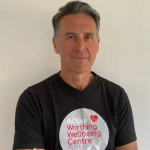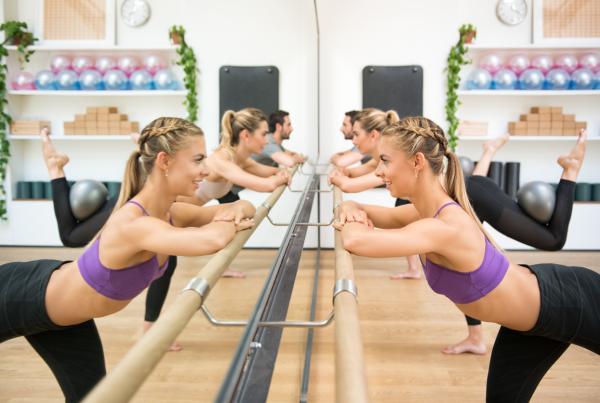Enzo Manco, director and co-founder of Active Wellbeing Centre Worthing (CIC), shares insight into his centre – a gym with a community touch where instructors are encouraged to spend some of their time doing voluntary work or assisting in rehabilitation classes – and explains the value of this people before profit approach.
We are not the standard vision of a gym. At Active Worthing Wellbeing Centre, we are a not-for-profit organisation that brings together the physical and social aspects of promoting good health. We apply for funding to keep the project working, some of which we get from Active Sussex, which is linked to Sports England. I work in the referral/rehab service side of the business, which is suitable for anyone who would benefit from increasing their physical activity levels – in particular, those with long-term health conditions, injuries or disabilities. We provide specialist activity classes and gym sessions across several sites in the Worthing area, designed to help our clients manage their conditions and maintain their independence. For this service, clients are referred to us by a medical professional.
GP referrals
Under the NHS, people with certain conditions (e.g., heart disease, diabetes, stroke) are offered an exercise prescription by their health practitioners – it can be for as few as four weeks or, if they’re lucky, as long as 12 – but, once that ends, what do they do next? Our service is designed to continue this process – gently encouraging and hopefully transforming people’s mindsets to prioritise and enjoy exercise, incorporating it into their daily lives to support improved health once their referral is complete. By developing new habits, clients not only increase their physical wellbeing but become engaged in the community, making new connections and feeling a sense of camaraderie, purpose and achievement. We offer a very affordable monthly fee to our members to utilise the hub, which includes the use of the gym and access to all our bespoke exercises classes, which is amazing really, and those who come to us say, “we never before realised we could enjoy exercise!”
We have a very good relationship with the local physiotherapy teams and meet around three times a year. We’ve created a rapport with them and invite them to use our gym for their final session or if they simply want to encourage people to do exercise, as most local physiotherapists don’t have access to a gym. This also helps to make people familiar with the environment and the venue. We don’t charge the physiotherapists for this.
To work with NHS referrals, a PT/coach/instructor needs a L3 Diploma in Exercise Referral and at least one Level 4 qualification and should be aiming always to learn more by studying for more qualifications. We are perennial students in this world. This means that the instructor has the correct knowledge and understanding to ensure safe and effective exercise programmes for those with a number of medical conditions. A Level 4 qualification allows instructors to specialise in niche areas such as cardiac rehabilitation, lower back pain management, exercise for mental health, exercise for arthritis, obesity and diabetes management, cancer rehabilitation and falls prevention. We encourage our instructors to spend some of their time doing voluntary work or assisting in rehabilitation classes run by local medical organisations, whether public or private, to experience the real patient-medical professional behaviour environment.
A community concept
Our centre is a health hub in the broadest sense – we don’t even call it a gym to our members because, for our members who are aged 70+ on average, a gym is a place with people in Lycra or sporting bulging muscles. No, you come in with comfortable clothes and comfortable shoes to do exercise – we’ve even had gentlemen in tweed – it just allows them to do exercise which, in a normal day, it’s difficult to do. We promote the skills required for increased physical activity and confidence in an environment that nurtures positive interpersonal relationships and a sense of belonging.
The concept is community. As well as physical health, we also work on mental health and loneliness. We ask people to come out of their houses and, at the hub, they talk, meet others and share, and we always have a positive attitude. We don’t want people to be afraid of using the gym. We do a lot of work on positivity to break down fear of the gym and exercise. All our instructors need to be able to deal with groups of people who have many different conditions. We don’t patronise. We listen and make it a really joyful moment. We talk to people about why we do exercise, the effect it has on the brain and the chemicals coursing through their bodies. I like to take it back to the mind all the time and remind them why they feel better through exercise.
The Life Skills Club at the hub focuses on reablement/preventative skills in combating social isolation and helps people maintain independence. The activities provided include coaching members with memory, speech, reading and writing, IT skills and, generally, just socialising. The club is suitable for people with acquired brain injury, mild learning disabilities, mental health and those who may be socially isolated. Clients can self-refer to this service or be referred by a medical professional, social services or social prescribers.
Finding the right instructors
It hasn’t been easy to recruit the right instructors for the facility. Not all instructors are ‘people people’; there is a modern perception that you can make a lot of money doing PT and I ask, “What do you know about the people you are going to help? Are you in it for the money or are you in it because you are a giver who wants to help the community?” The people coming to us are not just a number being referred by the GP, they are a person. We always need to be a shoulder to lean on. We don’t run this service to be millionaires; we do it because we love the job and we love seeing the results.
Primarily, specialists working in this field must be kind, patient and empathetic. They are working with people who may or may not be used to physical exercise and have little or no confidence in their physicality. Therefore, being positive, reassuring and friendly helps to encourage clients onwards in their health journeys. An ability to regard clients as individuals and being able to read situations from their viewpoint is also essential because, once you understand their concerns, you can begin to alleviate them. This leads to a sense of safety and trust, all of which help to foster self-belief. A sense of fun helps too, so creating an enjoyable experience is important – clients will want to keep coming back!
Just giving someone time and attention can really make all the difference. Watching clients becoming more confident is very fulfilling, as you are initiating a change in mindset. For many people, the fear of injury and misguided beliefs about hurt and harm can significantly influence the development of chronic incapacity. However, by attending a centre such as ours, we can help to break down that fear. Evidence has shown that by confronting fear and removing the irrationality around it, mobility can increase.
Success stories
We have had so many success stories and heart-melting moments. Recently, a woman came for an hour-long induction and, afterwards, she said she couldn’t thank me enough – she couldn’t remember the last time she’d spent an hour talking with another human being! Loneliness really is an international disease. Some of the people who come to my class at the start can’t even sit, or stand, or walk, or move their shoulders. It’s wonderful to see them progress and be able to do these essential movements for a fulfilling life.
People always talk about a glass being half full or half empty but, for me personally, it’s just a blessing to actually have a glass and, with it, anything is possible.

Enzo Manco
Enzo Manco is director and co-founder of Active Worthing Wellbeing Centre (CIC) and has had several decades of experience in the sports business. As a former footballer, martial arts practitioner and fencer (épéeist), he’s had the opportunity to learn and observe a variety of sports’ movements, which he has incorporated into his Pilates style and other types of training classes. He has had a great success in helping people, mostly through the GP referrals and, being a clinical hypnotherapist, he has helped people to gain results with the Solution Focused method.
Interested in rehabilitation? Find out more in this FitPro blog post on Rehabilitating clients following total hip replacement surgery







